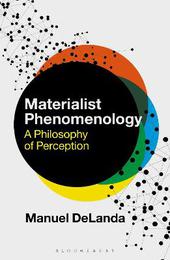
|
Materialist Phenomenology: A Philosophy of Perception
Hardback
Main Details
Description
Bringing together phenomenology and materialism, two perspectives seemingly at odds with each other, leading international theorist, Manuel DeLanda, has created an entirely new theory of visual perception. Engaging the scientific (biology, ecological psychology, neuroscience and robotics), the philosophical (idea of 'the embodied mind') and the mathematical (dynamic systems theory) to form a synthesis of how to see in the 21st century. A transdisciplinary and rigorous analysis of how vision shapes what matters.
Author Biography
Manuel Delanda is a Mexican-American cross-disciplinary theorist. He is Professor at the European Graduate School and Visiting Professor at the School of Architecture at Princeton University, USA. His books include A New Philosophy of Society (2006), Philosophy and Simulation (2011), Intensive Society and Virtual Philosophy (2013 and Philosophical Chemistry (2019), all published by Bloomsbury.
ReviewsThis is arguably DeLanda's best work, and that's really saying something, as he has produced 30 years of innovative philosophy. Materialist Phenomenology is extensively and insightfully scientifically informed, bridges differing schools of philosophy with rigor and fairness, and is written with exemplary lucidity. * John Protevi, Phyllis M. Taylor Professor of French Studies, Louisiana State University, USA * Bringing together phenomenology and materialism, two perspectives seemingly at odds with each other, DeLanda once again makes an important contribution to theory at large. A well informed, transdisciplinary and rigorous analysis of how vision shapes what matters. * Rick Dolphijn, Associate Professor of Media and Culture Studies, Utrecht University, the Netherlands *
|